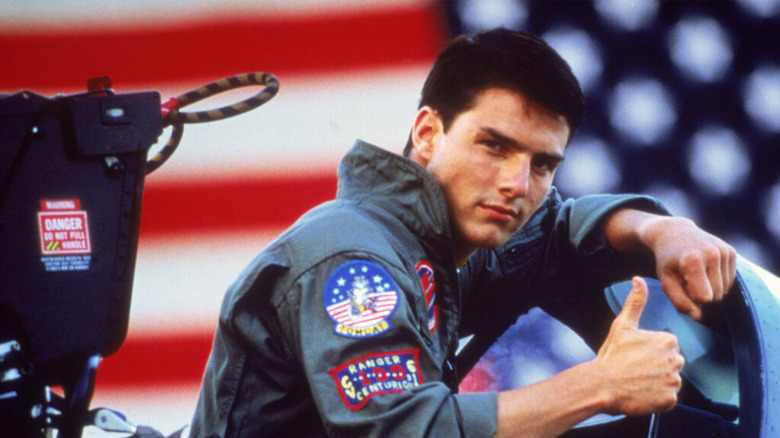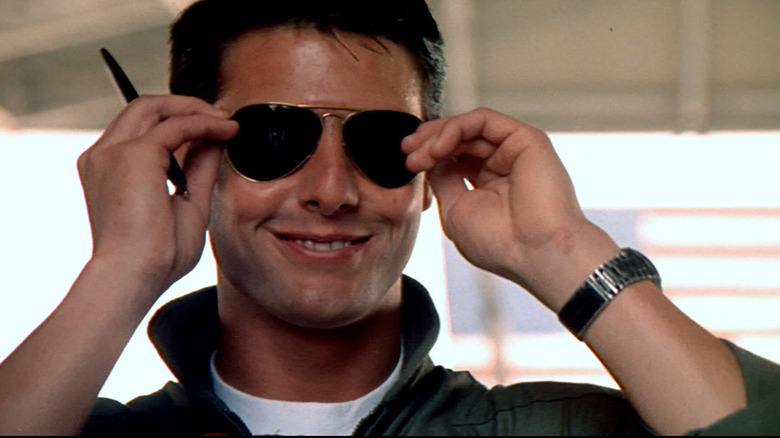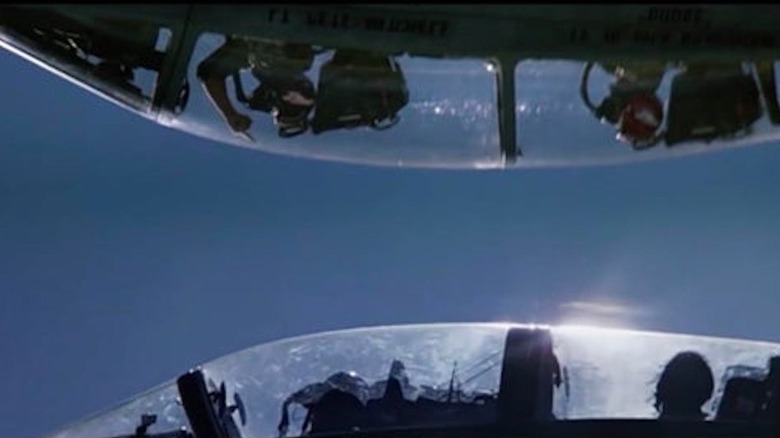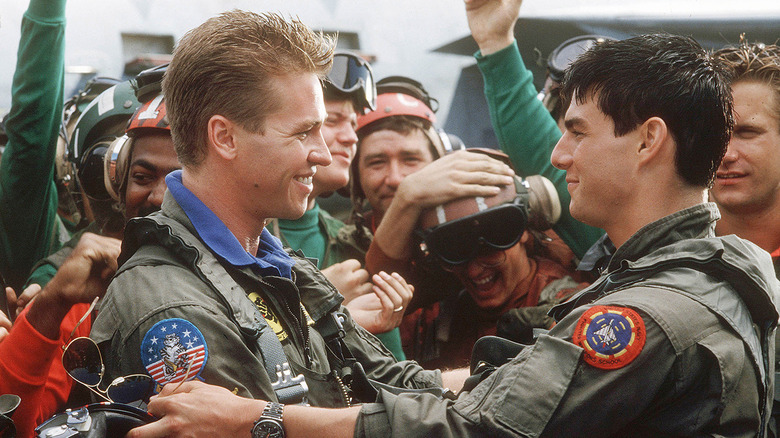Top Gun Was A Lie Told With Style
We may receive a commission on purchases made from links.
Tony Scott's "Top Gun" is as spectacularly entertaining as it is terminally stupid. For a film glorifying the exploits of elite Navy fighter pilots, this is not necessarily a drawback. Released one year after "Rambo: First Blood Part II" ignited American audiences' ardor for jingoistic blockbusters, "Top Gun" reaffirmed Tom Cruise's superstar status, turned bomber jackets into must-wear apparel and spurred a 500% spike in Navy recruitment. It was a pop cultural phenomenon that hung out in the top 10 of the domestic box office throughout the entirety of summer 1986. When it hit home video on March 10, 1987, Paramount marked it down to $26.95, a far, affordable cry from the standard, prohibitively expensive price of $89.99 (which favored video store rentals). The studio even cut a Diet Pepsi commercial to promote the video release. You couldn't watch or think about "Top Gun" without feeling like you were being sold a bill of goods.
I was 12 years old, on the cusp of my first year in junior high, and I barely remember seeing "Top Gun" theatrically. I had my cinematic priorities that summer, and they were called "Aliens," "Big Trouble in Little China," and "The Fly." I do know that when I finally saw "Top Gun" in August, it was the first time I'd ever consciously viewed a movie as product. There wasn't much of a story. Cruise's Pete "Maverick" Mitchell was a smirking cipher whose hot-dog attitude served as sketchy overcompensation for his fighter-pilot dad getting shot down during the Vietnam War. The third-act conflict was ludicrously light on tension, hinging on the rescue of a disabled communication ship that had strayed into enemy waters. This had nothing on Sigourney Weaver strapping into a cargo loader and beating the holy hell out of the queen xenemorph.
Making high-concept hay
So why does this movie still have such a powerful hold on the American imagination?
Apologies for being a broken record on this subject, but Americans did not handle the failure of the Vietnam War well. It was a massive embarrassment for a country that played a pivotal role in rescuing civilization from fascism in World War II. Upon further investigation, it was essentially one long war crime. After the failure of Jimmy Carter's grassroots presidency, the U.S. yearned anew for its patriotic former glory (with a former C-list movie star in the White House). Culturally, this set the table for the vigilante fantasies of Charles Bronson as well as the militaristic fever dreams of red-meat merchants like Sylvester Stallone and John Milius.
The glitz-obsessed production team of Don Simpson and Jerry Bruckheimer cared more about packaging than politics. The sober-minded Bruckheimer got his start in advertising, while Simpson, an incorrigible hedonist whose outsized pharmaceutical appetites tragically caught up with him in 1996, cut his teeth in studio marketing. They saw the developmental studio crap-shoot of the 1970s turn into a managed gamble in the 1980s. They preached the gospel of high-concept pitches (i.e. projects that can be sold in the room via a single sentence or an image). "Top Gun" was the apotheosis of their production philosophy. The project was inspired from a photograph, published in a 1983 issue of California magazine, of a fighter jet reflected in the helmet visor of a Navy pilot. Bruckheimer called it "'Star Wars' on Earth." Given that the team was scorching hot off the box office success of "Beverly Hills Cop," Paramount greenlit the movie posthaste.
It's the package, stupid
Here's where it gets icky.
On a purely stylistic level, Simpson and Bruckheimer were right to seek the approval of the U.S. Navy. The film was going to live or die on its aerial combat footage, and those sequences were going to look so much more spectacular if Scott's crew could shoot operational, state-of-the-art aircraft. In the Reagan era, the Navy was receptive to Hollywood, but, like any person or entity that throws more than a couple of shekels into film production, they had notes. While the U.S. had a very clear, Cold War enemy in the Soviet Union, the Navy did not want to poke that bear. So the film's two major combat scenes were moved to the Indian Ocean, where our heroes encounter MiGs of indistinct origin. This lowered the heck out of the stakes, but the box office tells no lies. The package delivered.
But at what cost? Kids streamed out of "Top Gun" believing they had a god-given facility as Americans to best every foreign-born fighter pilot on the planet. It was manifest aerial destiny made flesh via the lights-out charm of Tom Cruise. When Maverick's blasting MiGs out of the sky at the end of the movie, you feel an outlaw exhilaration. These faceless, humorless warriors of a totalitarian state can't handle our cowboy verve. Factor in that miraculous Harold Faltermeyer score and those stupidly timeless Kenny Loggins songs, and, s***, where's the nearest recruiting office?
Lying with style
Everyone with a stake in "Top Gun" got what they wanted out of it: Scott became a go-to studio filmmaker (who could turn out nuanced classics when he wanted to), the Navy got loads of fresh meat, Simpson and Bruckheimer burnished their hit-making reputation, and Tom Cruise reminded the world that he is, and always will be, Tom Cruise. And now, 36 years later, we get a nostalgia-laden sequel that may very well outstrip its predecessor in terms of emotionality. I haven't seen it yet, but as a huge fan of Joseph Kosinski's heartbreaking "Only the Brave," I am absolutely looking forward to it.
That said, I believe there are limitations on what a product like this can deliver in the midst of myriad national crises. Indeed, such a film could get us believing that bright, shining lie again. A rah-rah, pro-military-might movie is not something we need right now. A film nostalgic for an era where we embraced patriotic foolishness to assuage the pain of losing an unpopular war feels awfully out of place in 2022. I might not remember watching "Top Gun" in a theater, but I know full well the damage it did to our country's psyche. I watched it happen. "Top Gun" bought us here.
I also watched the original movie again today, and smiled through the whole damn thing. As far as lies go, it's distressingly joyous. If nothing else, we could lie with style back then.



